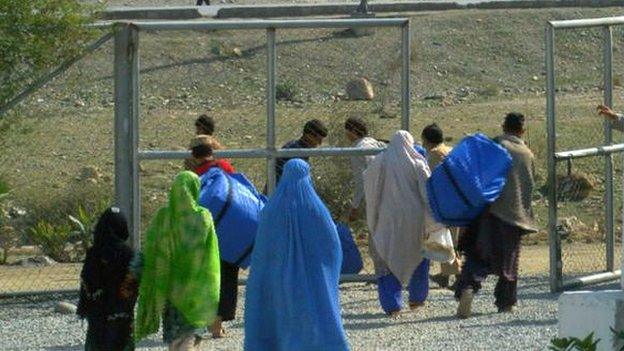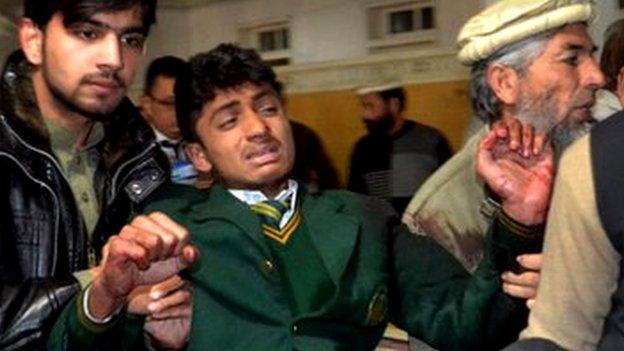'Harassment' drives Afghan refugees from Pakistan
- Published

Thousands of Afghan refugee families have left Pakistan this year - a huge rise in returns compared to 2014
A campaign of arbitrary arrests and harassment is driving Afghan refugees out of Pakistan, according to testimony gathered by the BBC. Families who have lived in Pakistan for decades say the intimidation started soon after the deadly Taliban attack on an army school in Peshawar in December.
Abdul Samad recently got married, but for him and his wife there is no honeymoon.
Together with five other relatives, they have crossed the border from Pakistan into Afghanistan with just a few household utensils, clothes and mattresses.
They are among several thousand Afghan refugees who have been passing through the busy Torkham border crossing on the Khyber pass every day since the start of the year.
And like many others, Abdul Samad's family say they did not leave of their own free will.
'The police beat me a lot that night'
"I was asleep at home with my wife; my brother and mother were also sleeping in their rooms," he says. "That night the police came. They jumped over the wall of our house and came in asking how many of us were in the house."
Abdul says the police asked for identity cards and when it turned out he was Afghan, he was taken away.
"They beat me a lot that night. The next evening, we paid 35,000 Pakistani rupees for my release," Abdul recalls.
"When bomb blasts happen in Peshawar, Karachi or any other place in the country, they would accuse Afghans, saying all of them are Taliban."
Once he was out of custody, Abdul and his family decided to leave.

Afghan refugees are passing the Torkham border crossing into an uncertain future

BBC reporters spoke to families camped out in the open, unsure what would come next
'We've suffered'
The BBC heard similar claims from other refugees at Torkham, most arriving in overloaded pick-up trucks and buses.
They described a pattern where male members of a family were being detained and sometimes mistreated in order to encourage them to leave the country.
One man, Ghulam Nabi, said he had been held for over a week: "I was imprisoned for eight days. Afterwards I went back for my family and belongings and passed through the border."
Another Afghan, Ghulam Sakhi, said constant harassment made him want to leave.
"We're either arrested in the bazaar or they came for us at home," he said. "We've suffered. We haven't gone out to work for more than a month. We hope the government will help us in Kabul, give us a tent and some food as we have nothing. We've only got enough money for the bus fare to Kabul."
Afghan officials told the BBC that between 150 and 300 families have been returning to Afghanistan every day since the Peshawar attack, in which Taliban gunmen killed more than 150 people, most of them children. Before that the number of returnees stood at around 15 families a day.
Precise figures are hard to come by, but aid agencies working in the region have seen the same trend.

Aid agencies say they can help only a fraction of those leaving
The International Organisation for Migration (IOM) reported more than 33,000 Afghans returning since January, one-and-a half times more than during all of 2014.
The IOM said it was currently only able to assist about 10% of the most needy.
"Some of the returnees have cited harassment, arrests, detentions and evictions as the reasons for their return during interviews with UNHCR staff," UN refugee agency (UNHCR) said.
'Militant hideouts'
The Pakistani government denies there is any campaign to systematically expel Afghan refugees.
But following the 16 December attack on the army-run school in Peshawar, police in Khyber Pakhtunkhwa province have been conducting special "strike and search" operations, trying to flush out militants, but also arresting many people they say are illegal refugees.
The government of the province which has traditionally hosted most of the refugees, called for unregistered Afghans to be repatriated.
A spokeswoman for the Pakistan foreign ministry, Tasnim Aslam has said the authorities needed to take action because militants were hiding among unregistered refugees, knowing that those staying illegally would not go to the police.
"There are indications that wherever they are concentrated, those places are being used as terrorist hideouts, and we have to take action on that," Tasnim Aslam said, according to Reuters news agency.
Meanwhile, the Afghan authorities have declared themselves overwhelmed.
Minister for refugees and repatriation Said Hussain Alimi Balkhi is due to visit Pakistan on 1 March. He told the BBC he would to ask for more time so shelter and aid can be prepared.
"The expulsion of Afghan refugees by our Pakistani brothers is an unfair and a very rapid decision," Mr Balkhi said. "We don't have any preparations in place, but we welcome our refugees."

Afghan refugees returning from Pakistan say they've been harassed to make them leave
Many of those returning have lived in Pakistan for decades; many were born there. Pakistan hosts more than 1.5 million registered Afghan refugees, the largest refugee population in the world, according to the UN. Many more reside in the country illegally.
But those having to leave with little warning face the loss of livelihoods, with some having to sell up just to cover the transport fare.
Some of the families told the BBC they were hoping to live with family members in Afghanistan. Others said they had no place to go to.
One woman, her face covered, said she had no idea what was ahead:
"I am very worried, I don't know whether we will have any work. We have very young children. That's why I'm unhappy about our earnings and the children and whether we will find a solution to our problems."
Reporting by Harun Najafizada and Hafizullah Maroof
- Published2 May 2014

- Published16 December 2014
